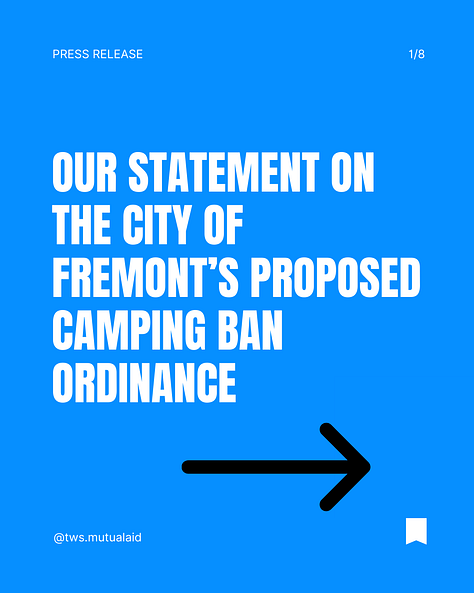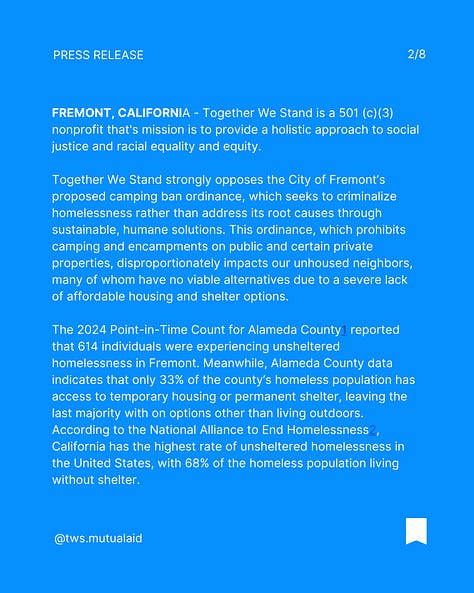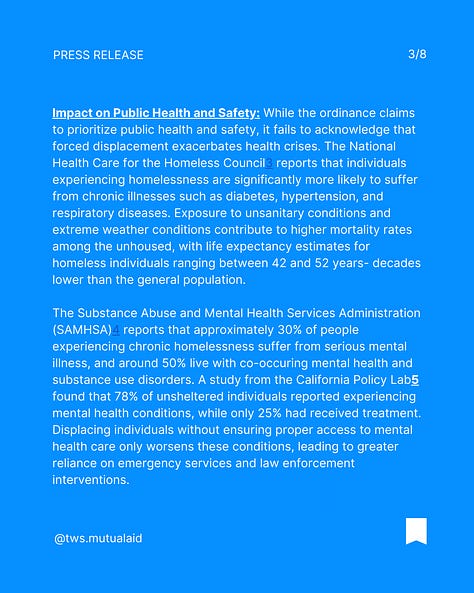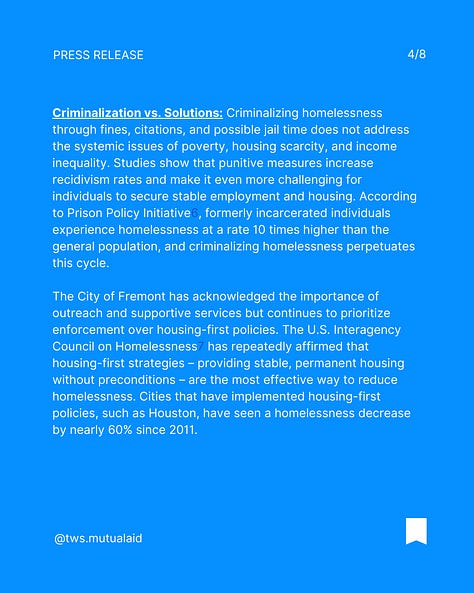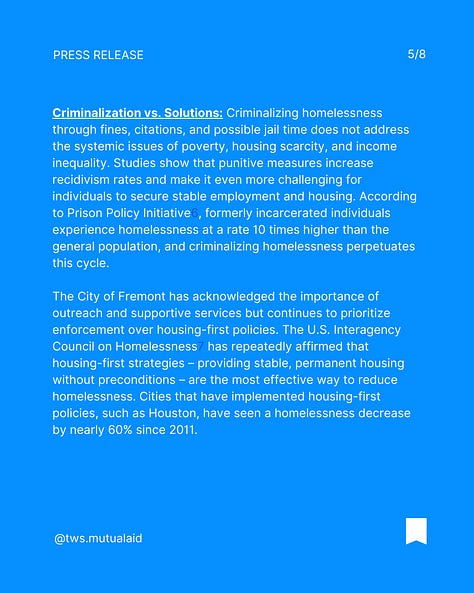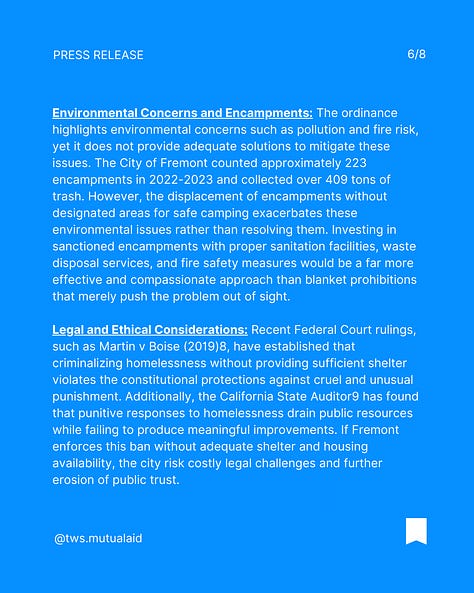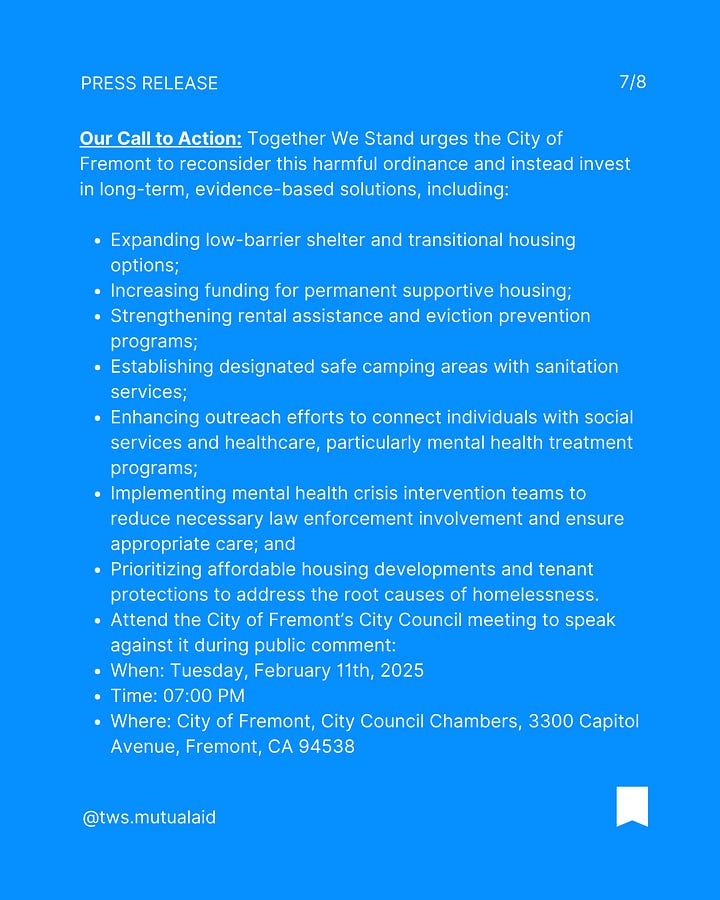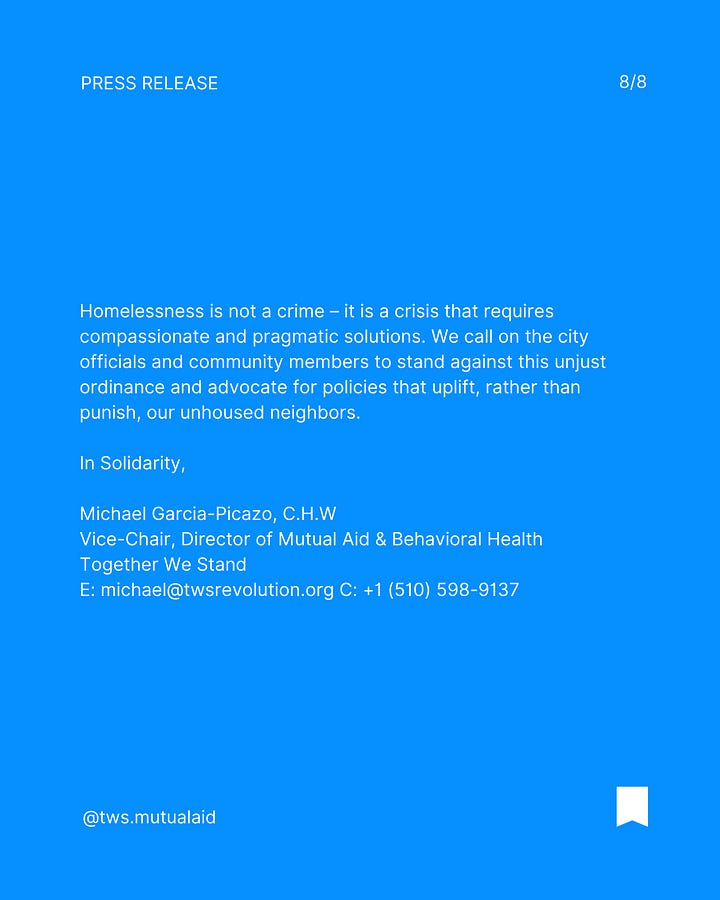TOGETHER WE STAND'S STATEMENT ON THE CITY OF FREMONT'S PROPOSED CAMPING BAN ORDINANCE
FOR IMMEDIATE RELEASE!
FREMONT, CALIFORNIA - Together We Stand is a 501 (c)(3) nonprofit that's mission is to provide a holistic approach to social justice and racial equality and equity.
Together We Stand strongly opposes the City of Fremont’s proposed camping ban ordinance, which seeks to criminalize homelessness rather than address its root causes through sustainable, humane solutions. This ordinance, which prohibits camping and encampments on public and certain private properties, disproportionately impacts our unhoused neighbors, many of whom have no viable alternatives due to a severe lack of affordable housing and shelter options.
The 2024 Point-in-Time Count for Alameda County1 reported that 614 individuals were experiencing unsheltered homelessness in Fremont. Meanwhile, Alameda County data indicates that only 33% of the county’s homeless population has access to temporary housing or permanent shelter, leaving the last majority with on options other than living outdoors. According to the National Alliance to End Homelessness2, California has the highest rate of unsheltered homelessness in the United States, with 68% of the homeless population living without shelter.
Impact on Public Health and Safety: While the ordinance claims to prioritize public health and safety, it fails to acknowledge that forced displacement exacerbates health crises. The National Health Care for the Homeless Council3 reports that individuals experiencing homelessness are significantly more likely to suffer from chronic illnesses such as diabetes, hypertension, and respiratory diseases. Exposure to unsanitary conditions and extreme weather conditions contribute to higher mortality rates among the unhoused, with life expectancy estimates for homeless individuals ranging between 42 and 52 years- decades lower than the general population.
The Substance Abuse and Mental Health Services Administration (SAMHSA)4 reports that approximately 30% of people experiencing chronic homelessness suffer from serious mental illness, and around 50% live with co-occuring mental health and substance use disorders. A study from the California Policy Lab5 found that 78% of unsheltered individuals reported experiencing mental health conditions, while only 25% had received treatment. Displacing individuals without ensuring proper access to mental health care only worsens these conditions, leading to greater reliance on emergency services and law enforcement interventions.
Criminalization vs. Solutions: Criminalizing homelessness through fines, citations, and possible jail time does not address the systemic issues of poverty, housing scarcity, and income inequality. Studies show that punitive measures increase recidivism rates and make it even more challenging for individuals to secure stable employment and housing. According to Prison Policy Initiative6, formerly incarcerated individuals experience homelessness at a rate 10 times higher than the general population, and criminalizing homelessness perpetuates this cycle.
The City of Fremont has acknowledged the importance of outreach and supportive services but continues to prioritize enforcement over housing-first policies. The U.S. Interagency Council on Homelessness7 has repeatedly affirmed that housing-first strategies – providing stable, permanent housing without preconditions – are the most effective way to reduce homelessness. Cities that have implemented housing-first policies, such as Houston, have seen a homelessness decrease by nearly 60% since 2011.
Environmental Concerns and Encampments: The ordinance highlights environmental concerns such as pollution and fire risk, yet it does not provide adequate solutions to mitigate these issues. The City of Fremont counted approximately 223 encampments in 2022-2023 and collected over 409 tons of trash. However, the displacement of encampments without designated areas for safe camping exacerbates these environmental issues rather than resolving them. Investing in sanctioned encampments with proper sanitation facilities, waste disposal services, and fire safety measures would be a far more effective and compassionate approach than blanket prohibitions that merely push the problem out of sight.
Legal and Ethical Considerations: Recent Federal Court rulings, such as Martin v Boise (2019)8, have established that criminalizing homelessness without providing sufficient shelter violates the constitutional protections against cruel and unusual punishment. Additionally, the California State Auditor9 has found that punitive responses to homelessness drain public resources while failing to produce meaningful improvements. If Fremont enforces this ban without adequate shelter and housing availability, the city risk costly legal challenges and further erosion of public trust.
Our Call to Action: Together We Stand urges the City of Fremont to reconsider this harmful ordinance and instead invest in long-term, evidence-based solutions, including:
Expanding low-barrier shelter and transitional housing options;
Increasing funding for permanent supportive housing;
Strengthening rental assistance and eviction prevention programs;
Establishing designated safe camping areas with sanitation services;
Enhancing outreach efforts to connect individuals with social services and healthcare, particularly mental health treatment programs;
Implementing mental health crisis intervention teams to reduce necessary law enforcement involvement and ensure appropriate care; and
Prioritizing affordable housing developments and tenant protections to address the root causes of homelessness.
Attend the City of Fremont’s City Council meeting to speak against it during public comment:
When: Tuesday, February 11th, 2025
Time: 07:00 PM
Where: City of Fremont, City Council Chambers, 3300 Capitol Avenue, Fremont, CA 94538
Homelessness is not a crime – it is a crisis that requires compassionate and pragmatic solutions. We call on the city officials and community members to stand against this unjust ordinance and advocate for policies that uplift, rather than punish, our unhoused neighbors.
In Solidarity,
Michael Garcia-Picazo, C.H.W, Vice-Chair, Director of Mutual Aid & Behavioral Health
Together We Stand E: michael@twsrevolution.org C: +1 (510) 598-9137
Citations
Alameda County 2024 Point-in-Time Count Data: https://everyonehome.org/wp-content/uploads/2024/01/PIT-2024-Report.pdf
National Health Care for the Homeless Council Reports: https://nhchc.org/
U.S. Interagency Council on Homelessness: Housing First Approach: https://www.usich.gov/solutions/housing-first/
Substance Abuse and Mental Health Services Administration (SAMSHA) Reports: https://www.samhsa.gov/homelessness-programs-resources
Martin v. Boise, 920 F.3d 584 (9th Cir. 2019): https://cdn.ca9.uscourts.gov/datastore/opinions/2019/04/01/15-35845.pdf
National Alliance to End Homelessness: https://endhomelessness.org/
California Policy Lab Homelessness Reports: https://www.capolicylab.org/
Prison Policy Initiative: Homelessness and Incarceration: https://www.prisonpolicy.org/
California State Auditor Report on Homelessness: https://www.auditor.ca.gov/
